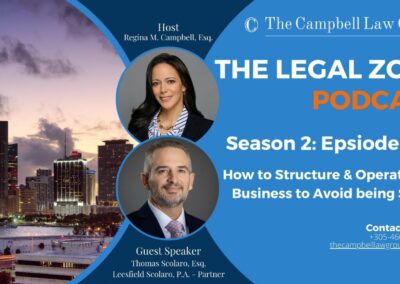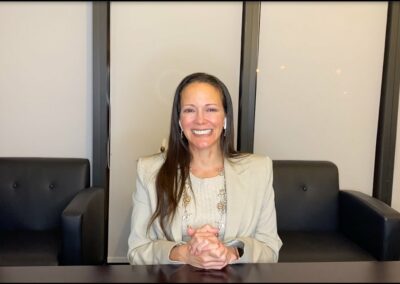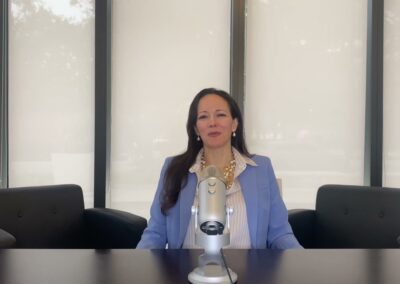Florida has established laws and regulations to safeguard businesses and consumers from dishonest or unethical practices. These protections ensure that companies can operate with transparency and integrity without the fear of fraud or unfair competition.
These laws include the Florida Deceptive and Unfair Trade Practices Act (“FDUTPA”), which is designed to protect consumers and businesses from deceptive or unfair commercial practices. The FDUTPA prohibits companies from engaging in a broad range of unfair or deceptive acts, such as false advertising, fraud, and misrepresentation.
More specifically, Fla. Stat. 501.202(2) states: “To protect the consuming public and legitimate business enterprises from those who engage in unfair methods of competition, or unconscionable, deceptive, or unfair acts or practices in the conduct of any trade or commerce.
However, the term “unfair practice” is not specifically defined in the statute. Some courts have interpreted it to mean a practice that goes against established public policy and is morally, ethically, or substantially injurious to consumers. In Samuels v. King Motor Co. of Boca Raton, the court defined “unfair” as one that is “immoral, unethical, oppressive, unscrupulous or substantially injurious to consumers,” citing Spiegel, Inc. v. Fed. Trade Comm’n.
Nor does it define what is a “deceptive practice” according to some courts, an act can be considered deceptive if it is likely to mislead consumers. This was established in the case of Davis v. Powertel, Inc., where the court defined deceptive practices as such.
As you may have noticed, cases involving unfair and deceptive trade practices can be complex and difficult to navigate, underscoring the importance of engaging a skilled and experienced attorney.
Examples of unfair and deceptive trade practices
- False advertising: This includes making false or misleading claims about a product or service in advertisements or promotional materials.
- Bait-and-switch: This involves advertising a product or service at a low price to attract customers but then convincing them to buy a more expensive product or service once they are in the store or on the website.
- Deceptive pricing: This includes practices such as false discounts, price fixing, or charging hidden fees.
- Misrepresenting product quality: This involves falsely representing the quality, nature, or characteristics of a product or service.
- Unfair competition: This includes practices such as stealing trade secrets, engaging in espionage, or copying another company’s product or marketing strategy.
- Pyramid schemes: This involves recruiting members into a scheme where the primary source of income is from recruiting new members rather than from the sale of products or services.
- Unfair debt collection: This includes practices such as harassing debtors, using deceptive tactics to collect debt, or misrepresenting the amount owed.
- Unfair warranty or return policies: This includes policies that unfairly limit the rights of consumers, such as shortening the warranty period or making it difficult to return products.
What are the important things to know about FDUPTA claims?
FDUPTA claims can be complex and challenging, so hiring an experienced attorney who can help you navigate the legal process is essential. To bring an FDUPTA claim, you need to demonstrate the following:
- A person or entity has committed a deceptive or unfair act while conducting trade or commerce.
- The deceptive or unfair act is the cause of the party’s injury or damages.
- The party needs to prove the amount of actual damages suffered.
How can Florida businesses defend themselves from FDUPTA claims?
Florida businesses can defend themselves against FDUPTA claims through several strategies:
- Demonstrating that their conduct was not deceptive or unfair: To show that their conduct did not violate the FDUPTA, businesses can provide evidence such as customer reviews, testimonials, and expert opinions to demonstrate that their advertising, sales practices, or other conduct were not misleading, deceptive, or unfair. Businesses can also show that they took reasonable steps to correct any misrepresentations or omissions that may have occurred.
- Arguing that the consumer did not suffer any harm: If the consumer did not suffer any actual damages, businesses can argue that there was no injury to the consumer and, therefore, no basis for a claim under the FDUPTA. However, it’s worth noting that some FDUPTA claims do not require actual damages, so businesses should consult with legal counsel to determine if this defense is appropriate.
- Proving that the consumer was aware of the alleged deception: To prove that the consumer was aware of the alleged deception, businesses can provide evidence such as customer statements or admissions demonstrating that the consumer knew or should have known about any misrepresentations or omissions.
- Showing that the conduct was unintentional: If the business can demonstrate that any unfair or deceptive conduct was unintentional, it may be able to avoid liability. For example, businesses can show that any misrepresentations were made inadvertently or resulted from an honest mistake.
- Arguing that the FDUPTA does not apply to the specific conduct at issue: Businesses may be able to argue that the FDUPTA does not apply to the specific conduct at issue. For example, businesses can show that the alleged unfair or deceptive conduct was not a “trade or commerce” practice covered by the FDUPTA or that the consumer did not suffer a loss due to the conduct.
- Settling the claim: If businesses decide to settle the claim, they can negotiate with the consumer to reach a mutually agreeable resolution. Settlements can include compensation for any damages suffered by the consumer, a change in business practices, or other remedies. Settlements can also include a confidentiality clause that prohibits either party from publicly discussing the settlement’s terms.
Get Help with Your FDUPTA Claim from The Campbell Law Group
If you believe that you have been a victim of an unfair or deceptive trade practice, it is crucial to contact an experienced attorney who can guide you through the legal process. At The Campbell Law Group, our attorneys have a deep understanding of FDUPTA claims and can help you build a strong case. We will work tirelessly to investigate your claim, gather evidence, and negotiate with the opposing party to ensure you receive the compensation you deserve.
Contact us today to schedule a consultation and learn how we can assist you with your FDUPTA claim.
Frequently Asked Questions
How can an attorney help me with my unfair or deceptive trade practices case in Florida?
If you are dealing with an unfair or deceptive trade practices case in Florida, an attorney can provide invaluable assistance in several ways:
- Legal expertise: An attorney who is well-versed in Florida’s consumer protection laws and regulations can help you comprehend the legal intricacies of your case, determine whether you have a viable claim, and advise you on the damages you may be entitled to.
- Investigation: An attorney can conduct a comprehensive investigation into the matter, gather evidence, and interview witnesses to build a strong case.
- Negotiation: An attorney can negotiate on your behalf with the opposing party, which could be a business or an individual accused of engaging in unfair or deceptive trade practices, in an attempt to reach a settlement.
- Litigation: If negotiations fail, an attorney can represent you in court and litigate your case. This includes filing a complaint, participating in discovery, arguing motions, and presenting evidence at trial.
- Advocacy: An attorney can act as your advocate throughout the legal process, safeguarding your rights and interests and striving for a fair resolution to your case.
What types of damages can I recover in an unfair or deceptive trade practices case in Florida?
In Florida, victims of unfair or deceptive trade practices can recover various types of damages, depending on the specifics of the case. Some of the common damages that can be recovered include:
- Compensatory damages: These are damages awarded to compensate the victim for any losses suffered as a result of the unfair or deceptive trade practice. Compensatory damages can include things like lost profits, expenses incurred, and other direct damages suffered by the victim.
- Punitive damages: These damages are awarded in addition to compensatory damages and are intended to punish the defendant for their conduct and to deter similar behavior in the future. In Florida, punitive damages are only available in certain cases, such as those involving intentional misconduct or gross negligence.
- Injunctive relief: In some cases, the victim may seek an injunction to stop the defendant from engaging in unfair or deceptive trade practices. An injunction is a court order that prohibits the defendant from engaging in specific conduct or requires the defendant to take certain actions.
- Attorney’s fees and costs: In some cases, the court may award attorneys’ fees and costs to the prevailing party. This means that the defendant may be required to pay the victim’s legal fees and expenses in addition to any damages awarded.
It’s worth noting that the specific damages available in an unfair or deceptive trade practices case can vary depending on the facts of the case and the specific laws involved.
What is the statute of limitations for filing an unfair or deceptive trade practices claim in Florida?
In Florida, the statute of limitations for filing an unfair or deceptive trade practices claim varies depending on the specific law that has been violated. For example:
- Florida’s Deceptive and Unfair Trade Practices Act (FDUPTA) has a four-year statute of limitations. This means that a victim must file a lawsuit within four years of the date that the unfair or deceptive trade practice occurred.
- The Florida Consumer Collection Practices Act has a one-year statute of limitations. This means that a victim must file a lawsuit within one year of the date that the unfair or deceptive debt collection practice occurred.
It’s important to note that other laws or regulations may apply to your situation, and the statute of limitations may differ for those claims. It’s always best to consult with an experienced attorney who can advise you on the specific statute of limitations that applies to your case.
In any case, it’s generally advisable to file a claim as soon as possible after discovering an unfair or deceptive trade practice. Delays can make gathering evidence and pursuing a successful claim more difficult.
What should I do if I suspect a business has engaged in unfair or deceptive trade practices in Florida?
If you suspect that a business has engaged in unfair or deceptive trade practices in Florida, there are several steps you can take:
- Keep records: Keep any records related to your interaction with the business, including receipts, contracts, emails, and letters.
- Contact the business: Consider contacting the business to resolve the issue directly. Keep a record of any conversations or correspondence with the business.
- File a complaint: You can file a complaint with the Florida Attorney General’s Office or the Federal Trade Commission (FTC). The FTC is a federal agency that investigates and prosecutes unfair and deceptive trade practices. The Florida Attorney General’s Office also investigates and prosecutes violations of Florida’s Deceptive and Unfair Trade Practices Act (FDUPTA).
- Contact an attorney: Consider consulting with an experienced attorney who can evaluate your case and advise you on the best course of action.
- Consider filing a lawsuit: If you have suffered damages as a result of the business’s unfair or deceptive trade practices, you may be able to file a lawsuit to recover those damages. An attorney can help you evaluate whether a lawsuit is viable in your case.
It’s important to act quickly if you suspect a business has engaged in unfair or deceptive trade practices. The longer you wait, the harder it may be to gather evidence and pursue a successful claim.















